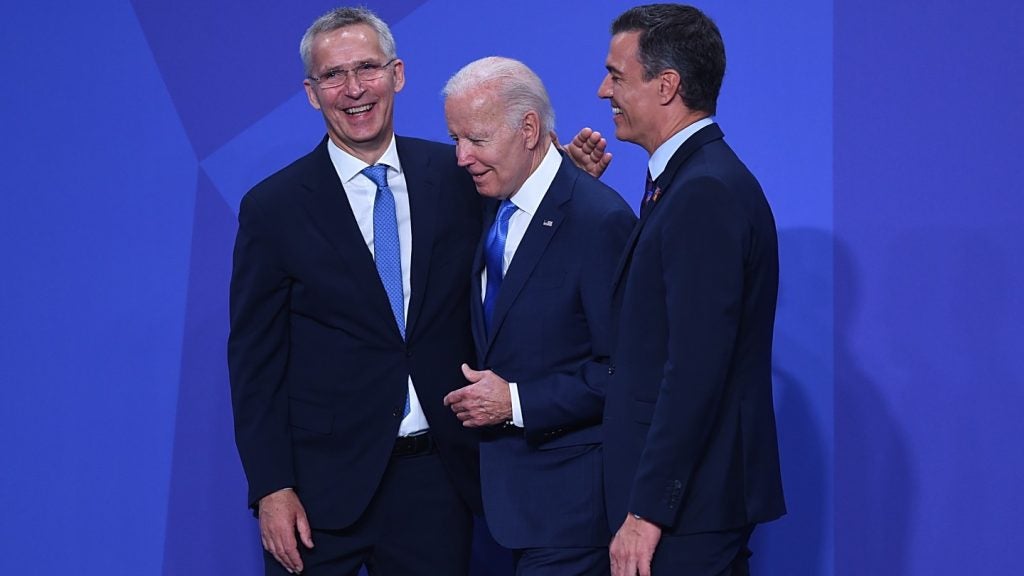
When former US President Donald Trump said he “would encourage” Russia “to do whatever the hell they want” to Nato members who do not meet its 2% spending target if he returns to the White House, Madrid bristled.
Spain is the EU’s fourth-largest economy, but Nato forecasts reveal Madrid will spend less on defence as a percentage of GDP this year than any other country in the 32-member alliance.

Discover B2B Marketing That Performs
Combine business intelligence and editorial excellence to reach engaged professionals across 36 leading media platforms.
Despite historic increases, Spain is projected to spend just 1.28% of GDP on defence in 2024 – a statistic which left Prime Minister Pedro Sánchez feeling the pressure at this week’s Nato summit in Washington D.C.
Spain and Canada came under the heaviest fire for subpar defence spending, a lingering stain on the summit somewhat buried by news of a new $43bn military package for Ukraine – and President Biden mis-introducing Ukrainian premier Volodymyr Zelensky as “President Putin” yesterday (11 July).
While Madrid’s defence budget remains a “painful reality”, in the words of Spanish Defence Advisor Carlos Delgado Fernández, “there are certain nuances that deserve attention”.
Beyond the numbers – is Spain still one of Nato’s “most significant partners”?
Despite accusations that Spain is ‘Nato’s defence spending laggard’, Fernández believes Madrid is committed to transatlantic security in other ways. Specifically, leading Nato missions, defending the alliance’s southern flank – and supporting Ukraine.
“No one can question the assistance that Spain provides to Nato on the eastern border of Europe, in the Baltic, or with the permanent presence of Navy ships in the Nato missions SNMG-1 and SNMG-2 in the North Atlantic and the Mediterranean respectively,” Fernández tells Army Technology.
The Spanish Navy handed over command of Nato’s SNMG-1 maritime mission to Denmark earlier today (12 July), following a six-month deployment.
Spain has sent Ukraine air defence systems, tanks, armoured carriers and artillery systems with ammunition, including a rumoured four Patriot missiles. In May, Madrid signed a bilateral security cooperation agreement with Kyiv, pledging €1bn ($1.08bn) in further military aid.
Such shipments will have dented Spain’s military supplies, but do not appear to have curbed Sánchez’s willingness to support Zelensky.
On Wednesday (10 July) in Washington, the Spanish premier emphasised Spain’s “solidarity with Ukraine” and role in “the stability and development of the Mediterranean”.
“Nato should also listen to its most significant partners, such as Spain, regarding the new challenges and threats that Nato will face in the near future on the Southern border,” Fernández says. “Recognising what Spain advocates in Nato forums regarding upcoming threats would indeed be a real incentive for defence investments and direct support to Nato.”
Spain’s “anti-militarism political culture”
Sánchez remains buffeted by both sides.
For every call from Spain’s Nato allies and opposition parties (the conservative ‘Partido Popular’ and far-right ‘Vox’) to ramp up military expenditure, there is a rebuttal from Sánchez’s coalition allies (the leftist ‘Sumar’ platform) or accusation of hypocrisy from the hard-left ‘Podemos’ party.
“Spain’s political culture remains quite anti-militarism in general since [General Franco’s] violent dictatorship from 1939 to 1975, after the Spanish Civil War [1936 to 1939],” James Marques, defence analyst at GlobalData, tells Army Technology.
An attempted army coup in 1981 prompted Madrid to join Nato in 1982 – with Spain only voting to remain in the alliance by a narrow margin in a referendum four years later.
“This attitude is quite bi-partisan, and after the impact of the 2008 financial crisis, close-run elections and a lot of discord over the matter of Catalan independence, bringing up defence spending at all remains unpopular,” says Marques.
In line with these attitudes and his party’s socialist credentials, Sánchez has pushed non-military support for Ukraine. Spain has taken in more than 200,000 Ukrainian refugees, earmarked reconstruction funds, and backed Ukraine’s judicial efforts to go after Russia for war crimes.
This also aligns with Sánchez’s diplomatic efforts around Israel’s ongoing offensive in Gaza, with Spain recognising Palestinian statehood alongside Ireland and Norway in May – a stance that Sánchez reinforced at the Nato summit.
Spain pledges to hit 2% by 2029. Will it?
Two years ago, Sánchez again drew the angst of Spain’s leftists by pledging to hit the 2% of GDP defence spending mark by 2029 – just after his second term as Prime Minister is due to end.
Initial signs suggest Sánchez will stick to his word.
Madrid spent $13.1bn on defence last year (0.8% of GDP), according to GlobalData’s Spain Defense Market 2023-2028 report, a 22.5% increase from 2022. Nato countries collectively spend about $1.2trn on defence annually.
Should Spain hit the projected 1.28% this year, “the fruits of this decision, though very early, are already beginning to show positive results”, according to Fernández.
Madrid has begun rolling out dozens of Leopard tanks, as well as some older Hawk air defence systems. Other major procurement programs include a new generation of combat aircraft alongside France and Germany, new F110 frigates through Navantia and a new RPAS system under OCCAR.
For others, scepticism lingers.
“If a country like Poland said it would hit 2% by 2029 (theoretically speaking, as Poland already spends above 2%), I’d be inclined to believe them,” Marques says. “But for Spain, setting the goalpost that far away feels a little like kicking the can down the road in the expectation that the goal will never be reached, some sort of economic headwind or the outcome in Ukraine will push the issue even further away in priority before then.”

For Sánchez and his party, a finely poised balancing act begins.
At every Spanish parliamentary sitting, he will face criticism for neglecting the country’s education or healthcare needs should he keep increasing defence expenditure. At every Nato summit, he will continue to face pressure from his fellow heads of state – none more than Donald Trump, should the Republican candidate triumph against an increasingly brittle Biden in November’s elections.






